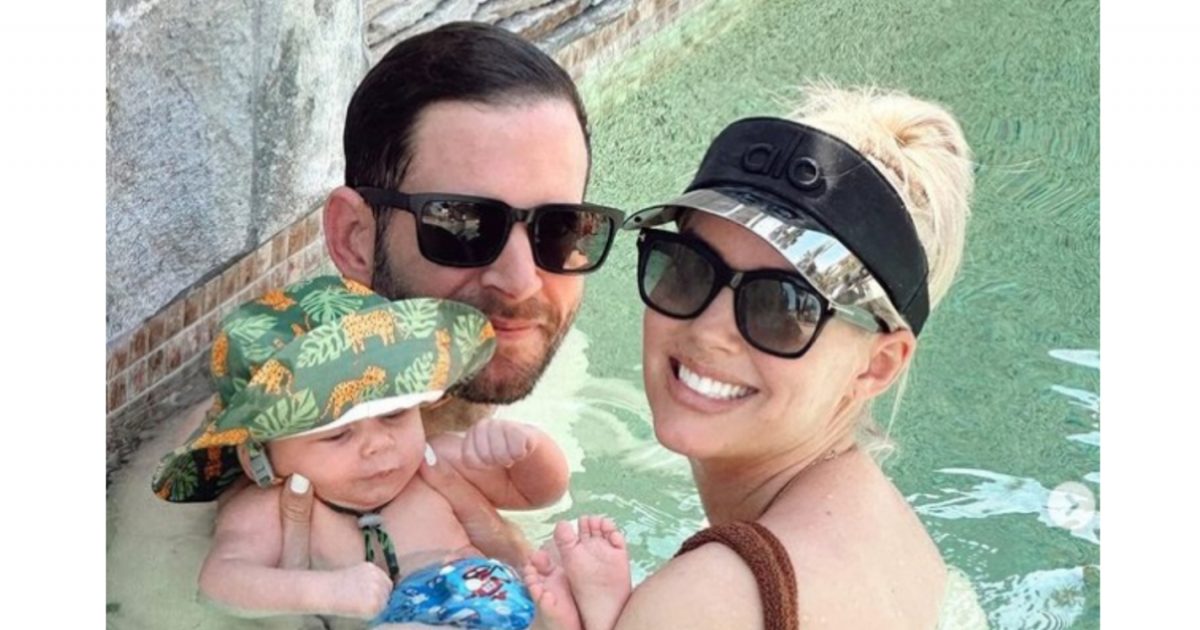Fertility and Cancer Treatment
- Reality star Heather Rae El Moussa said she almost didn’t believe her positive pregnancy test while she and husband Tarek El Moussa were dealing with fertility struggles after his cancer treatments.
- The El Moussas are the stars of HGTV’s “The Flipping El Moussas.” They welcomed their first child together in January.
- Heather recently opened up about almost blowing off the test that revealed her pregnancy because she was convinced she wouldn’t be able to get pregnant naturally.
- According to the American Cancer Society, cancer treatment can "affect hormone levels and can also affect your ability to father children after treatment." That’s why some men choose to store sperm in a sperm bank before treatment even begins.
- Meanwhile, fertility typically returns after treatment for most testicular cancer warriors because they often only develop the cancer in one testicle.
Infertility can be caused by some cancer treatments. But Tarek and Heather are showing survivors everywhere that’s not always the case.
Read More
View this post on Instagram
“Feels like I blinked and our lives changed forever,” she wrote in her caption. “To back up a little, I was two days late on my period and Tarek super casually said I should take a pregnancy test… so I did but I kind of blew it off because I didn't think I was pregnant.
“Fast forward to after taking the test, I went back upstairs and saw that I was PREGNANT!!! I was in shock and felt so overwhelmed with happiness, I couldn't believe it.”
The El Moussas Celebrate Their Family
- Family After Cancer: TV Host Tarek El Moussa, 41, Takes Dance Lessons With Daughter as HGTV Show Gets New Season
- TV House Flippers Tarek El Moussa and Wife Heather Rae Celebrate Big ‘First’ With Adorable Baby Tristan Born After Cancer Battles: How Cancer Affects Male Fertility
- HGTV Star Tarek El Moussa Cuddles With Baby Tristan, Born 10 Years After Testicular Cancer Battle Fatherhood and Fertility After Treatment
Heather continued by explaining that she took another test to confirm the results. And just like that, the couple realized they had overcome their fertility struggles.
“Here we are almost a year later with the greatest gift of life,” she wrote.
The El Moussas Share Their Fertility Journey
Before discovering they were pregnant, Tarek and Heather Rae El Moussa were very open about their struggles with fertility.
"Having testicular cancer, he had to be on testosterone," Heather said during an interview on the television show "The Doctors." "I was actually shocked that I had not known this before being a young couple that maybe would wanna have children that the testosterone he was taking could have been blocking his sperm."
View this post on Instagram
That’s why the couple decided to go through in vitro fertilization (IVF) “a complex series of procedures used to help with fertility or prevent genetic problems and assist with the conception of a child,” according to the Mayo Clinic.
Shockingly enough, the couple even had a scheduled date to transfer an embryo when they found out Heather had become pregnant naturally.
"It was a huge shock," Heather told People in July 2022. "We just weren't expecting this. We had just gone through IVF. We had embryos on ice. We had a plan.
"I think when you least expect it and there's no stress in your life, the world just brought us what was meant to be. I'm so excited that it happened like this."
View this post on Instagram
The couple had their first baby boy together on Jan. 31, 2023, and life has not been the same since.
“It was scary, but beautiful & I had the best support from Tarek, my incredible @drlisakaramardian and all the nurses at Hoag,” Heather wrote about her birthing story on Instagram in February.
Becoming a Father After Testicular Cancer
Tarek and Heather El Moussas were concerned about conceiving naturally because of Tarek’s testicular cancer treatment. But it’s important to know you can still have a child after testicular cancer.
According to the American Cancer Society, treatment can "affect hormone levels and can also affect your ability to father children after treatment." That’s why some men choose to store sperm in a sperm bank before treatment even begins.
That being said, testicular cancer can cause low sperm counts, so getting a good sample can be difficult. Even still, men have several options for fathering children even when sperm counts are low.
Becoming a Father After Cancer Todd Rosenbluth's Story
It should also be noted that boys and men often only develop the cancer in one testicle. So, fertility typically returns after treatment.
The American Cancer Society says testicular cancer warriors who’ve undergone chemotherapy, for example, typically regain fertility two years after chemo stops.
And if you need more proof that testicular cancer does not necessarily mean permanent infertility, consider Todd Rosenbluth’s story.
Rosenbluth was diagnosed with testicular cancer in his late 20s after his wife urged him to go to his annual appointment with his doctor. He and his wife struggled to conceive for quite some time after his cancer battle, but doctors assured him his cancer was not to blame.
If You're Worried Go to the Doctor
"Unrelated to the testicular cancer, my wife and I did have fertility issues," Todd told SurvivorNet. "We had been trying for four years to have a child. They tell you it's not related to the fertility issues at all.
“But in your head, when you're having all these troubles, and you did lose a testicle, you feel the blame.”
Thankfully, Todd and his wife were eventually able to welcome their beautiful son Milo into the world in March 2018. That's when Todd finally felt like he was free from his cancer.
"The safest I felt with my testicular cancer was when my son was born," he said.
Learn more about SurvivorNet's rigorous medical review process.


